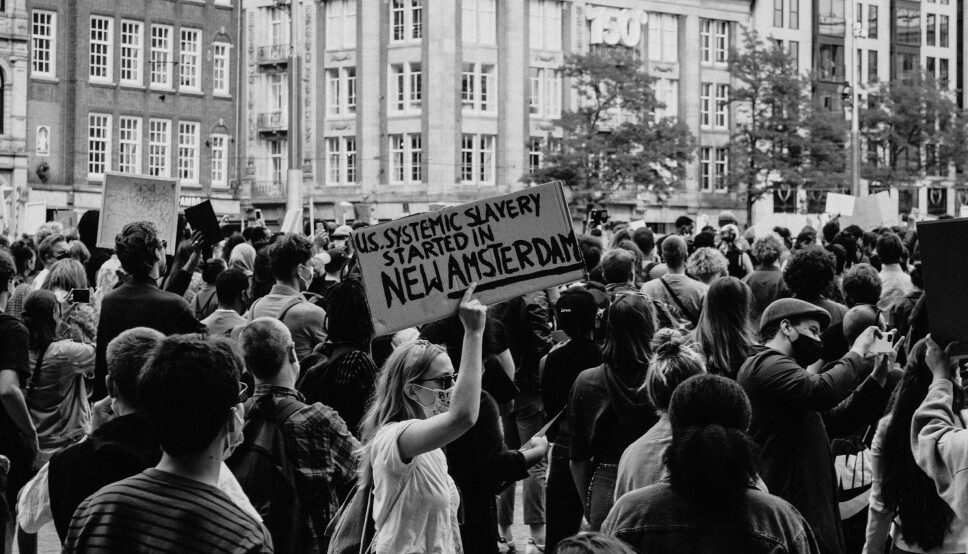
Right Now!

Why Black Pete matters: Institutional racism and police violence in the Netherlands
Black Lives Matter has shaken up political discussions about racism across the globe. In the Netherlands, it has led to yet another escalation around the ‘Black Pete’ controversy, Iris Beau Segers argues that the empty rhetoric, inaction and opportunism of (radical) right politicians indicates their continued reluctance to tackle institutional racism at its roots.
Black Pete: ‘not racist but possibly hurtful’
It is not often that Dutch Prime Minister Mark Rutte openly addresses issues related to racism and discrimination. As a member of the liberal-conservative People's Party for Freedom and Democracy (VVD), Rutte opposes state intervention in matters of ‘culture’ and ‘tradition’, such as the infamous Black Pete in the Sinterklaas celebrations.
However, since the global Black Lives Matter movement sparked protests across many Dutch cities, the PM revisited his position. In a recent press conference, he said “Black Pete is folk culture, it is a tradition, it is absolutely not racist. But I do realize that there are people who find it hurtful.”
It goes without saying that ‘understanding’ that ‘people’ might find the use of blackface ‘hurtful’ does not even come close to taking a stance against the racism experienced by black Dutch citizens. But the statement was so controversial for the standard Dutch public debate, that it became headline news on the national public broadcasting platform (NOS).
‘Systemic’ racism in a ‘colourblind’ nation
In discussing racism in the Netherlands, we run into some serious obstacles. Most importantly, ‘racism’ is a term the Dutch are reluctant to use – it is generally perceived as something that happens elsewhere, in South Africa or the United States, for example. Due to the widespread self-image of being a tolerant, innocent and ‘colourblind’ nation, accusations of racism are often dismissed as outrageous. So, how can we even begin to address an issue that is largely denied outright?
Recent events have shown that right-wing politicians struggle to cope with the protests that are spreading across the country, demanding the end of racism and discrimination within Dutch borders. In his June 4 press conference , PM Rutte also addressed the issue of institutional racism in the Netherlands, which he defines ‘systemic racism’, arguing that the term ‘institutional racism’ is ‘sociological jargon’. This choice of words neatly fits within his broader tendency to treat racism as a matter that falls outside of the jurisdiction of the state, instead of beginning to address the deep-seated discrimination that takes place within Dutch politics, and more importantly, the police force.
When asked about the kind of action the government was aiming to take, Rutte argued that changing legislation or policies could not prevent racism from happening. Instead, he simply proposed to set social norms that reject discrimination and exclusion, saying that people who do discriminate will “have a big problem with me, and hopefully with you and many other people”.
Will there be more legal room for police violence?
However, a change in legislation is already underway, which makes Rutte’s words even more meaningless.
The First Chamber is currently debating the introduction of a controversial reform, which would broaden the legal use of violence by Dutch police. One of the key changes suggested in this reform, which has already been passed by the Second Chamber, is that police officers would no longer be automatic suspects in cases of violent incidents between police officers and citizens. Under the new legislation, were a citizen to die as a result of police intervention, police officers may only be charged for ‘transgressing the official instructions’, facing a maximum penalty of 3 years’ imprisonment (instead of the current maximum of 15 years for manslaughter).
The proposed changes would also broaden the circumstances in which Dutch police officers are allowed to use a taser, pepper spray, and firearms. Although the Black Lives Matter protests have been heralded by the media as a sign of sweeping change and support for anti-racism in the country, these proposed legal changes have thus far managed to fly under the radar of mainstream media, even when organizations such as Controle Alt Delete and Amnesty International have raised the alarm.
This is highly problematic, especially since ethnic profiling and police violence in the Netherlands are serious and widespread issues. Recent events in the United States might make these Dutch problems seem relatively small, yet in the Netherlands too, ethnic minority men in particular get hurt, or even die, at the hands of the police.
In 2015, Mitch Henriquez, an Antillean-Dutch citizen, died after being held in a neck clamp during an arrest, which the court ruled as ‘disproportionate use of force’. The court stated that the relatively low punishment for the officer was in part due to Henriquez’ resistance to being arrested – hardly an excuse for choking a citizen. The perpetrator received 6 months’ provisional jail time, and he was suspended from serving in the police for two years. His colleague, who hit Henriquez in the face and used pepper spray, went free. It is a jarring example of the leniency of the legal system under the current legislation, and shows how the suggested changes would make it even more difficult to hold police offers accountable in the future.
Eight deaths in 2020
The tragic death of Henriquez does not stand alone – Lilith Magazine reports that 33 people died at the hands of the Dutch police between late 2016 and late 2019. This year alone, eight people died, which shows a recent increase in police-related deaths. None of these incidents have been forwarded to the court by the Public Prosecution Service (‘Openbaar Ministerie’).
In addition, Amnesty International highlights that ethnic profiling is prolific in the Netherlands, and that people from ethnic minority backgrounds often feel discriminated against by the police. Earlier in 2020, a survey showed that about half of the people who had come in contact with the police in Amsterdam last year experienced ethnic profiling.
This issue is not unique to the police force. Last month, the Dutch Tax Office admitted to ethnic profiling in their tax control policies, after an investigation by newspaper Trouw and RTL news. Another investigation by public news agency NOS shows that Municipalities too, use information on people’s second nationalities to create ‘risk profiles’ of their inhabitants.
Full squares and empty words
Overall, there is more than enough reason to protest against racism in the Netherlands, even when covid-19 poses some risks to large gatherings. And yet, the spreading civil rights movement is presenting new political opportunities for the Dutch radical right, especially as the public debate connected the protests with the risks due to the global covid-19 pandemic.
On June 1st, the Mayor of Amsterdam, and former leader of the Green Left (GroenLinks), Femke Halsema, faced an unexpectedly large amount of Black Lives Matter protesters on the famous Dam square. It was the first protest of its kind in the Netherlands, and the large amount of people present on the relatively small square meant that covid-19 measures were not met – most importantly, there was not enough room for protesters to maintain the required 1.5 meter distance. Mayor Halsema decided against using the police force to break up the protest, as she feared it might lead to confrontations between the police and protesters. Overall, the protest proceeded peacefully, and it was followed by many other events across the country.
However, Halsema faced heavy critique from the Dutch right due to her perceived incompetence when dealing with the Dam protest. As the first ever female, Green Left Mayor of Amsterdam, she was accused by other politicians such as Thierry Baudet of being partial to ‘left wing issues’ such as protests against racism, and unfairly harsh on everyone else who has had to abide by the covid-19 measures. The conservative right VVD, and the radical right PVV and FvD submitted a motion of distrust, which after long debate was not passed in the Second Chamber.
It goes without saying that political leaders have a responsibility to maintain safety measures and protect protesters against the covid-19 virus. Halsema has indeed apologized for her decisions on June 1st, said it was an important lesson to learn from, and has called for an independent investigation to examine what went wrong and how events like this can be better dealt with in the future. None of this mattered to politicians like Geert Wilders and Thierry Baudet – they wanted her gone.
Call the beast by its name
The Black Lives Matter movement has provided a new entry point into addressing longstanding and largely ignored issues concerning racism and police violence in the Netherlands. However, the roots of Dutch racism go deep. In the last few weeks, we have witnessed empty rhetoric and inaction of a conservative Prime Minister, a largely silent parliamentary push for more legal police violence, and the opportunistic attempt of the radical right to remove the first female Mayor of Amsterdam. Together, it paints a grim picture of the current state of the Dutch public debate on institutional racism and police violence.
Black Lives Matter protesters continue to fill the streets and squares of cities across the country – peacefully, wearing facemasks, and largely maintaining proper social distance. It is a small step in a country where racism, until very recently, was denied and dismissed, rephrased into ‘less offensive’ terms, or treated as a strictly individual matter.
Hurtful as it may be, Black Pete is but a fragment of the broader spectrum of Dutch racism. “I don’t really care about Black Pete, I care about the things that happen on the other 364 days of the year” is what a Surinamese acquaintance recently said on the topic. Still, the continued protests and the widespread push for change send a strong message to Dutch politicians: it is time to call Dutch racism by its ugly name, and address it at its deep institutional roots.








